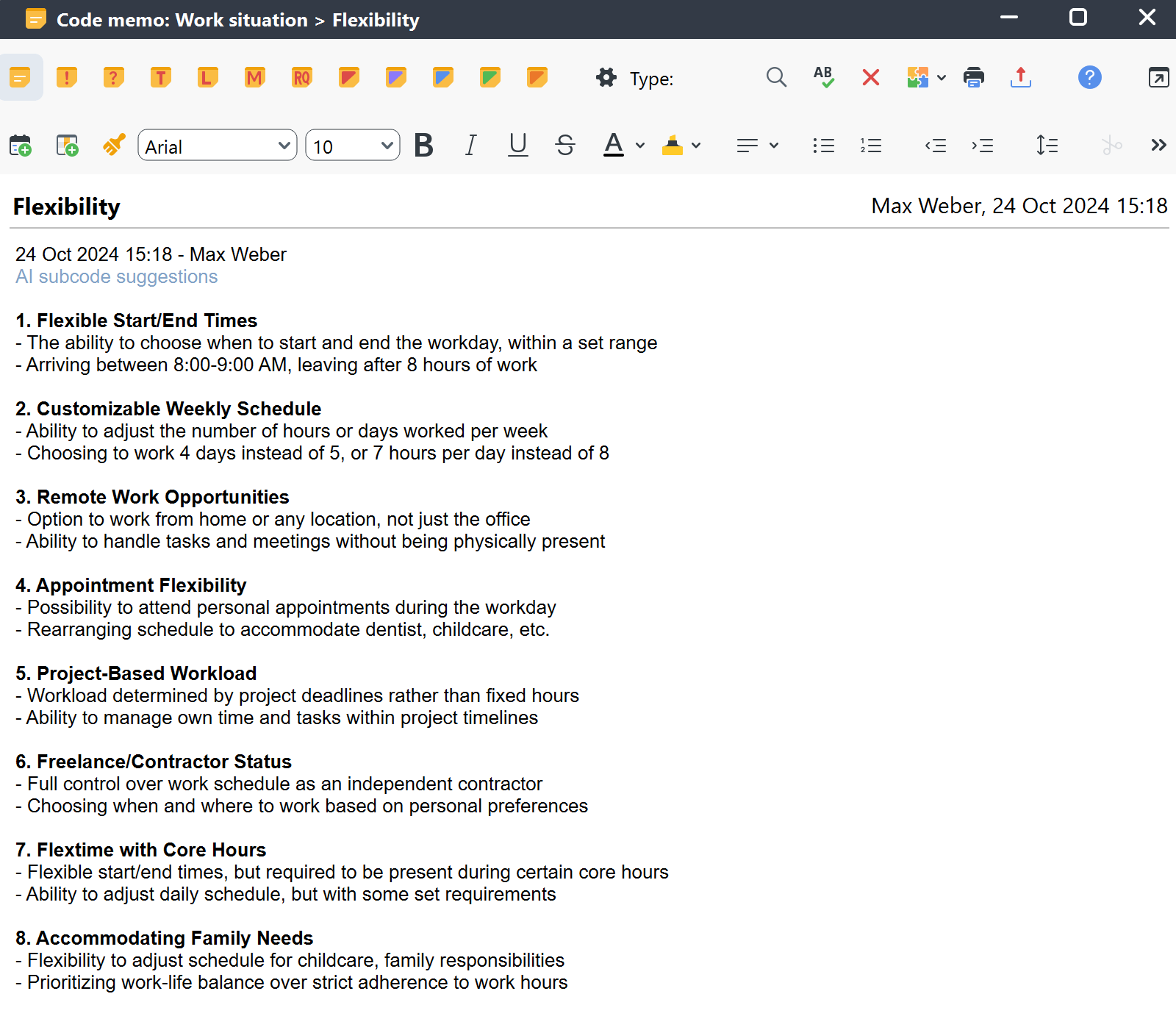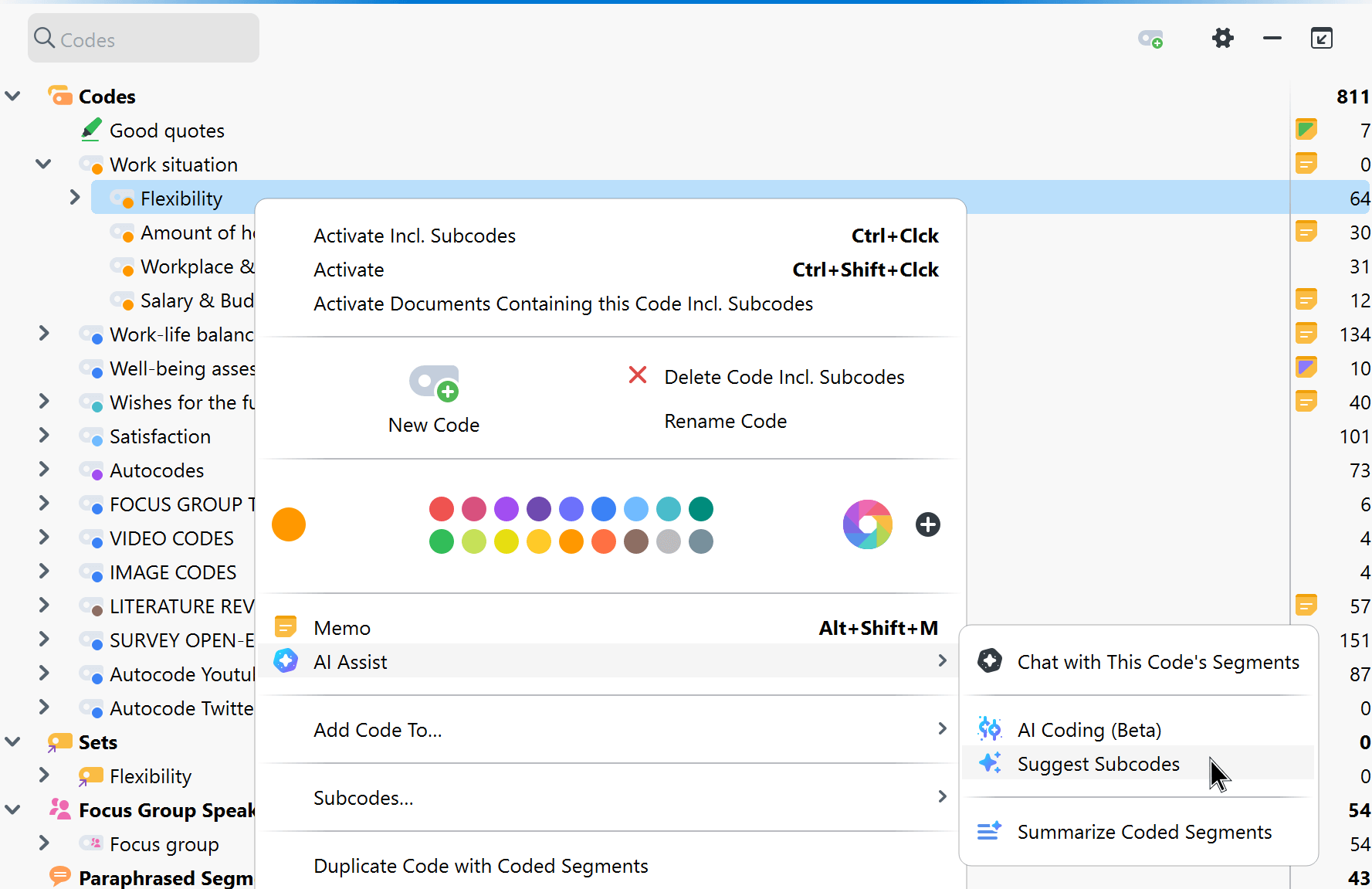With AI Assist, you can generate suggestions for how you could divide a code into subcodes. AI Assist analyzes the assigned text passages and provides recommendations in the code memo.
Optionally, you can include examples from the coded segments to illustrate each subcode suggestion, referencing the underlying data. You can evaluate these suggestions based on your research questions and objectives, and then apply them manually. This involves creating relevant subcodes and assigning them to the coded segments. Additionally, you can run the function multiple times for the same segments to generate different suggestions.

How to get subcode suggestions using AI Assist

Using the AI Assist main menu
- Navigate to MAXQDA's main menu bar and select AI Assist > Summarize Coded Segments, as seen above.
- In the dialog box that pops up, drag and drop the code from the codes window into the appropriate field to get subcode recommendations.
- Once you complete this step, you can further configure your AI summary request. Set the language, choose whether to include examples from the analyzed coded segments for each subcode suggestions, or add further instructions to guide AI Assist's analysis.
- By selecting the option Only activated documents you can limit the coded segments to be considered.
Through the "Code System" window

- Right-click a code in the code system to which you have already assigned text passages and select AI Assist > Suggest Subcodes in the context menu.
- In the dialog that appears, specify the desired language for the suggestions. The language selected for the suggestions may be different from the language of the coded segments; the coded segments may also vary in language.
- By selecting the option Add bullet list with examples for each subcode, the suggested subcodes will be supplemented with concrete examples from the analyzed coded segments.
- By selecting the option Only activated documents you can limit the coded segments to be considered.
Regardless of where you start the function, once you click OK, AI Assist analyzes the coded segments and presents suitable subcodes in the code memo, which will open up automatically. The new suggestions are added at the bottom of the existing memo text, so you may have to scroll to the end of the memo text.
Alternative ways to access this function in MAXQDA
The AI Assist: Suggest Subcodes function is not only available in the "Code System" window, but also at locations in MAXQDA where codes are presented, for example:
- In the Segment Matrix, start the function by right-clicking on a displayed segment.
- In the Smart Coding Tool, you can start the function by right-clicking on a code in the code tree. In this case, all coded segments, optionally only from activated documents, are considered for the suggestions. In the main ribbon bar of the Smart Coding Tool, AI Assist > Suggest Subcodes Based on Listed Text Segments is also available. This function considers only the currently listed segments.
Generate diverse subcode suggestions
The creation of subcodes for a given code is a data-driven and creative process, without a single right solution. Multiple subcode proposals can be equally valid. Please assess the suitability of a proposal for your specific application, considering the purpose of your analysis. To obtain alternative subcode suggestions, simply restart the function. The new suggestions will be inserted at the bottom of the code memo. Keep in mind that the probability of different suggestions increases when there are more segments with the code in question, and when the contents of those segments are more diverse.
It is usually worthwhile to call the function several times to generate different alternatives, as these may have different emphases and the number of suggested subcodes may vary. Please consider AI Assist's suggestions as a source of inspiration for the manual formation of subcodes, where different suggestions can also be combined.
Considerations to keep in mind
If the coded segments contain a lot of text, only a selection of the segments is considered for the creation of the subcode suggestions. In this case, AI Assist displays a note in the code memo below the suggestions about how many segments from how many documents were considered.
The name of the parent code is considered when creating subcode suggestions.
If AI Assist suggests very many subcodes with long explanatory examples, the text limit for the suggestions may be exceeded. In this very rare case, not all suggestions are output and there is a corresponding note at the end of the suggestions. Restart the function to get an alternative suggestion.
The subcodes suggested by AI Assist are all at the same hierarchical level, meaning no sub-subcode levels are provided. The explanatory examples are often presented in a condensed form, and only occasionally as quotes extracted from the original material.
Please note:
- AI Assist provides very good results for very many use cases. Nevertheless, it is important that you check the results.
- If you analyze texts with critical content (violence, hate speech, bullying, etc.), suggestions may not be created.
